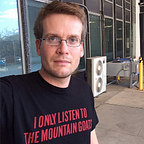The Greatest Sports Story Never Told
Most of my professional life has been devoted to telling stories for and about teenagers. But after my novels The Fault in Our Stars and Paper Towns were adapted into movies, I pitched the producers (Temple Hill) and studio (Fox 2000) of those movies a somewhat different story, about the greatest underdog sports story you’ve never heard, starring a bunch of middle-aged people with absolutely no athletic talent. And today, an agreement was announced, so I wanted to drop by Medium and explain why my next film project is about not American teenagers but a lower league English football club.
So, okay: In May of 2002, the English Football Association gave the owners of a club called Wimbledon F.C. permission to move 70 miles away, to a town called Milton Keynes. Despite fervent protests from Wimbledon fans, the FA decided that it was “not in the wider interests of football” to have a club based in Wimbledon.
This happens all the time in American sports — the Brooklyn Dodgers become the LA Dodgers, the Baltimore Colts became the Indianapolis Colts — but it doesn’t happen in England, where football teams are not franchises but rather community assets. For many Wimbledon fans, to lose their club was to lose their community. As one protest banner read, “A club is for life, not just for profit.”
Despite the defiant graffiti and protests, it appeared Wimbledon would be without a football club until a group of supporters decided they would just start a team. Of course, there were some initial challenges — for instance, none of them had any experience running a football club, and they also had no uniforms, no sponsors, no coaches, and no players.
They held open tryouts in a public park, hired a coaching staff, rented a stadium, found a video game company to sponsor them, and began the 2002–2003 season in ninth tier of English football. (In England, each season the teams that finish at the top of a league are promoted to the next tier up and those finishing at the bottom are relegated to the league below. If, for instance, Manchester United finished bottom of the league for four consecutive seasons, they’d be relegated from the Premier League to the Championship, then to League One, then to League Two, and then out of the professional Football League altogether.)
Of course, the quality of the football played in England’s ninth tier leaves a bit to be desired, but Wimbledon had a club again, and it would never be taken away, because each fan owned an equal share of the new team, now known as AFC Wimbledon. (There are various stories on the provenance of the “AFC,” but some say it stands for “A Fans’ Club.”)
And then a funny thing happened: They started winning. In fact, between February 2003 and December 2004, they didn’t lose a single game. They bought a small stadium, and got promoted to the eighth tier, and then the seventh. They rebuffed wealthy investors, preferring to remain fan-owned, even if it meant never getting back to the Football League.
All along the way, they’ve sung, “Show Me the Way to Plough Lane,” the name of their now-demolished stadium. “I’m tired and I want to go home. / I had a football ground twenty years ago / And I want one of my own.”
By 2011, just nine years after forming, AFC Wimbledon had worked their way back to the fifth tier of English football, just one promotion away from the Football League. They made it to the playoffs, and then to the final, where the game went to a penalty shootout. The Dons’ 19-year-old goalkeeper Seb Brown saved two penalties. And then Wimbledon’s captain, Danny Kedwell, stepped up to take the final penalty. In his 10-year career, Kedwell had never played a game in the Football League, and with one penalty he could take himself and his club there. What happened? Well, watch the video with commentary from the volunteers at Radio WDON.
And so it came to pass that a bunch of middle-aged people with normal jobs and no idea how to run a sports team founded a club that, in nine short years, rose through the ranks of amateur soccer and became a professional Football League club.
In 2013, when AFC Wimbledon defeated the team that had moved to Milton Keynes, it was hardly news. The Wimbledon fans sang, “Where were you / where were you / Where were you when you were us?” And they all stood and sang, “Stand up if you own your club.” And they sang, as they always do, “Show me the way to Plough Lane.”
Today, Wimbledon are 10th in League Two, and their plans for a new stadium in Wimbledon are well underway. And off the pitch, they continue to be a progressive force — AFC Wimbledon were the first club in England, for instance, to take a stand against homophobia.
By choosing community over profit, and by reminding us that hope is necessary even when it is also preposterous, AFC Wimbledon has shown the world the way to Plough Lane.
Football is a game where adults can sing together and cry together, a rectangle upon which we can see in manageable scale all that is good and terrible about people, all the injustice and folly and joy of human life. And when that rectangle was taken away from Wimbledon, they built it again, That resilience represents the very best of us, and I am so excited to be part of the team working to share that story with a wider world.
